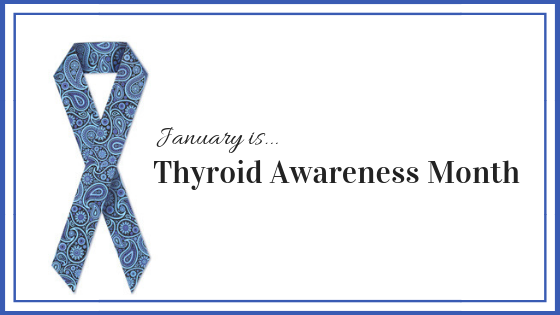By: Kelsey Davis
According to the American Thyroid Association, 20 million Americans will develop a thyroid condition in their lifetime. Plus, it is estimated that 60% of those with a thyroid condition are unaware they even have a medical issue. It is important to understand how your thyroid functions and common thyroid issues so you can address any concerns early on.
Thyroid Functions
Your thyroid is a gland that measures about two inches wide and generally only weighs between 20 and 60 grams. It is located at the base of your neck (in front of your trachea). While it may be small, it has an important role in your body. The thyroid gland produces three hormones called Thyroxine (T4), Triiodothyronine (T3), and Calcitonin. When these hormones are released, a substance called Thyroid Release Hormone (TRH) is created. TRH is responsible for communicating with the brain when these hormones should be released into the bloodstream. These hormones act on nearly every cell in your body and are responsible for maintaining cellular activity in your metabolism. When you don’t have the right amount of hormones, your metabolism can be weakened.
Common Thyroid Issues
There are several different types of thyroid issues. The most common thyroid issues are:
Hyperthyroidism
When the thyroid gland is overactive, it produces too many hormones. Symptoms can include restlessness, a racing heartbeat, irritability, anxiety, insomnia, and weight loss.
Hypothyroidism
When the thyroid is underactive, it can’t produce enough hormones. Symptoms can include fatigue, depression, weakness, slow heart rate, and weight gain.
Goiter
Goiter is a non-cancerous enlargement of your thyroid gland. This is often caused by an iodine deficiency in your diet. Symptoms may be hard to notice in beginning stages but can include neck stiffness, difficulty breathing, coughing, wheezing, and hoarseness.
Nodules
Thyroid nodules are growths that form on the thyroid gland. The cause is usually due to an iodine deficiency. Symptoms can include a high pulse rate, increased appetite, tremors, and weight loss.
Thyroiditis
When your thyroid becomes inflamed, you experience thyroiditis. This can be caused by hormones leaking and resulting in symptoms of hyperthyroidism. With time, your thyroid will underproduce the hormone if not treated properly. Symptoms include sweating, fatigue, heat intolerance, and puffy eyes.
Causes of Common Thyroid Conditions
The two most common ways that people develop thyroid conditions are through Grave’s Disease and Hashimoto’s Disease. Grave’s disease is the most common cause of hyperthyroidism. This is a disorder that leads your immune system to mistakenly attack your thyroid. This disease is most common in women and accounts for 70% of those with hyperthyroidism. Symptoms of Grave’s disease include anxiety, hand tremors, excessive sweating, and bulging eyes.
On the other hand, Hashimoto’s Disease is the most common cause of hypothyroidism. Symptoms can include hair loss, depression, fatigue, and weight gain. Apart from Grave’s and Hashimoto’s disease, causes can include autoimmune diseases, thyroid surgery, radiation therapy, and certain medications.
Diagnosis and Treatment
Thyroid issues are generally discovered through blood tests. These tests measure the level of thyroxine (T4) and TSH in your blood. A high level of T4 can indicate an overactive thyroid. TSH levels above 4.0 mIU/L indicate an underactive thyroid, but a level above 2.0 mIU/L shows you’re at risk. If any results come back as problematic, your doctor may suggest additional blood work like a T3 test, thyroid uptake test, or ultrasound. These tests can check for abnormal thyroid gland activity, structural problems, and tumors.
Depending on the type of thyroid issue, there are several different treatment options available. However, it’s important to discuss these options with a doctor. Routine check-ups and annual blood work can help you find problems in advance.
As you age, it may become difficult to spot the associated symptoms. Having the proper health care coverage is key to maintaining good health and remaining proactive. Our partners at Medicare Plan Finder can answer questions you may have about Medicare, Medicare Advantage plans, or prescription drug coverage. Complete this form or call them directly at 833-438-3676 to arrange a no-cost, no-obligation appointment with a certified agent in Middle Tennessee.


Recent Comments